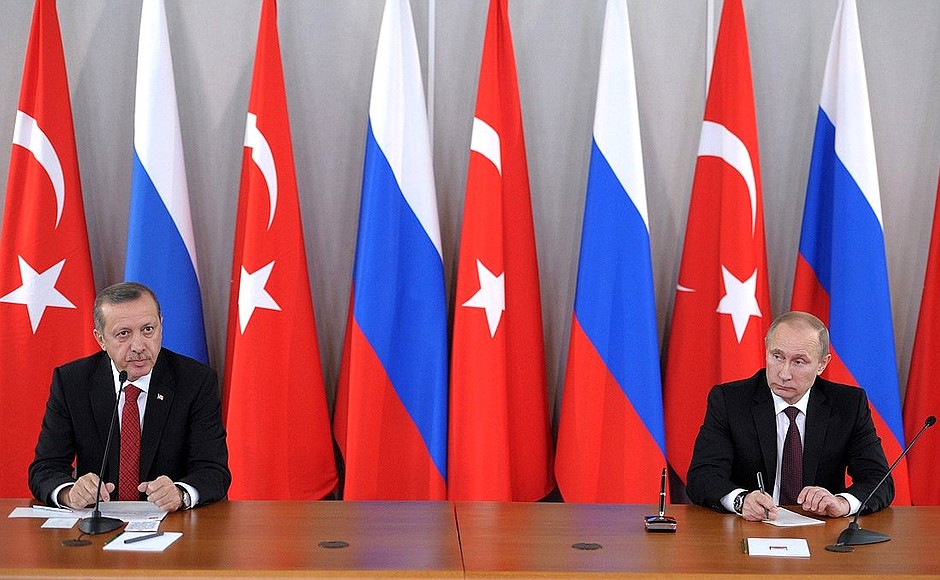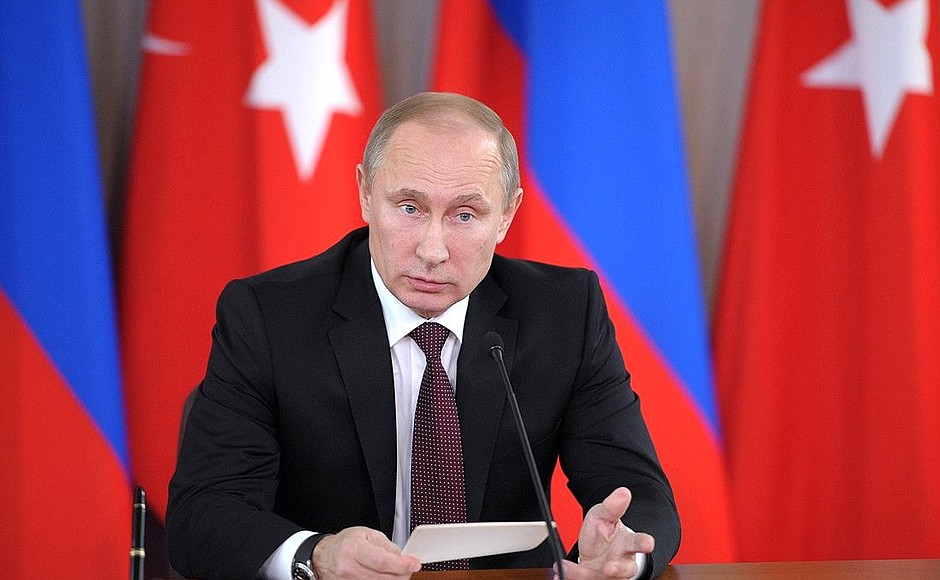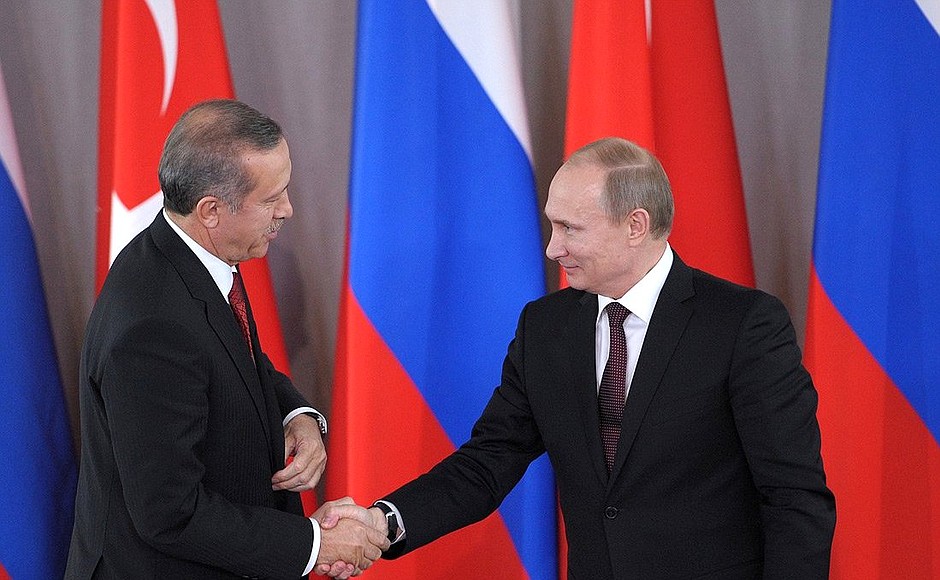President of Russia Vladimir Putin: Mr Prime Minister, ladies and gentlemen,
The High-Level Cooperation Council’s fourth meeting was business-like and constructive in spirit. This mechanism has proved its worth for the Russian-Turkish partnership.
I also had a very detailed and substantive personal meeting with the Prime Minister. We talked of course about the current state of our relations and the future prospects.
I note in particular that our cooperation is built on a mutually advantageous basis. Our trade turnover came to $34 billion last year. It has dropped slightly this year, but we think this is a correction that we will certainly overcome, and we will not only return to the level we achieved last year, but will aim even higher, at up to $100 billion. The flow of mutual investment is also growing.
The energy sector is an important area in our bilateral partnership. Russia is without question a strategic exporter of energy resources for the Turkish market.
We are continuing to develop our cooperation infrastructure. The Blue Stream pipeline system that links Russia and Turkey via the Black Sea bed is operating with success. We are working on the South Stream pipeline and will soon start building the underwater section. Russian companies are playing a very big part in supplying Turkey’s economy with not just gas but also oil and oil products.
Rosatom is building Turkey’s first nuclear power plant at Akkuyu. Investment in the plant’s construction comes to $20 billion. Russia is taking care of the financing. We are also training personnel for Turkey’s future nuclear energy industry. Of course, these projects all meet the most advanced environmental and technical safety standards.
We are continuing to develop our cooperation in industry and the high-tech sector. This can be seen in our work together in the metals sector. In particular, the Magnitogorsk Iron and Steel Works has invested money and technology in modernising a steel plant at Iskenderun. Russia’s companies, Power Machines and Tekhpromexport, are helping to modernise Turkish hydroelectricity facilities. The assembly in Turkey of Russian GAZ brand vehicles is another example of our successful cooperation.
See also
Turkish companies, for their part, are active on Russia’s construction market. They are actively involved in building the sports infrastructure in Sochi. I want to thank the Turkish builders for this. Their work is of a high standard and they meet their obligations and deadlines. I can quote an interesting figure: overall, Turkish companies are carrying out subcontracting contracts around Russia for a total of $50 billion.
We discussed today the idea of increasing settlements in our national currencies. We will facilitate inter-bank cooperation. As you know, Russia’s leading bank, Sberbank, has actively entered the Turkish market and has invested $3.6 billion in this sector of the Turkish economy.
We discussed the opportunities for intensifying our cultural and humanitarian ties. The Russian-Turkish Public Forum held its first full-format meeting in Kazan a few days ago. We will continue to support work in this area.
In 2012, 3.6 million Russian tourists visited Turkey. This year, it looks like we could hit a new record and the number of Russian tourists visiting Turkey will pass the 4-million mark. The number of Turkish citizens coming to Russia is also growing. We discussed today the possibility of holding reciprocal tourism years in our countries.
Of course we discussed international issues too, the situation in the Middle East in general and the situation in Syria in particular. We might have our differences on some points, but this does not prevent us from working together to find acceptable approaches to resolving serious international crises.
In conclusion, I want to thank Mr Erdogan and all of our Turkish friends for today’s work. In accordance with our established tradition, the Council’s next meeting will take place next year in Turkey.
Thank you very much for your attention.
<…>
Question (translated from Russian): The situation in Syria is worsening every day and innocent people are dying there every day. In this situation, what are your views on the need to establish humanitarian corridors in order to help civilians?
Russian-Turkish relations are developing dynamically overall, but there is an element of competition in them too. In particular, two cities – Izmir in Turkey and Yekaterinburg in Russia – are bidding to host World Expo 2020. What are your views on this competition?
Vladimir Putin: Yekaterinburg is the best choice of course. But if it’s not Yekaterinburg, then Izmir is the best choice. I imagine the Prime Minister has completely the opposite point of view.
Prime Minister of Turkey Recep Tayyip Erdogan (translated from Russian): Yes, I think the same way. But what if both cities win, what will happen then? That’s what worries me.
Vladimir Putin: In reality, given our intensive trade and economic ties, I think it would be equally of interest for us to take part in the Expo whether in Izmir or in Yekaterinburg. But of course we will compete.
Recep Tayyip Erdogan: We will be in solidarity with each other on this.
Vladimir Putin: As for the humanitarian issue, you know, I have not had any contact with the Syrian president, Mr Assad, since 2007. I spoke to him again for the first time on the telephone just a few days ago. I must say that he himself is worried by the humanitarian situation and is giving it his attention. The question is who is responsible for this tragedy. People might hold different views, but no one disputes that fundamentalist groups are actively fighting in Syria and are behaving in very ruthless fashion. Nonetheless, abstracting ourselves from this, we must not forget about the suffering the civilian population is going through. Mr Erdogan and I had a very detailed discussion of this issue and I share the Prime Minister’s concerns about this urgent problem. Ultimately, we both share the aim of bringing peace to Syria and preserving its territorial integrity. We agreed that we will work together to look for acceptable solutions. This concerns humanitarian problems too.
Question: Continuing with Syria, I have a question for Mr Erdogan. You said previously that you do not see a possibility of reaching a political settlement in Syria. Today you discussed this matter with Mr Putin. Could you tell us if Turkey’s position has changed in response to the positive cooperation between Damascus and the OPCW [Organisation for the Prohibition of Chemical Weapons]?
What is your view on holding the Geneva-II conference on Syria?
I have a question for Mr Putin too. Could you tell us, are there hopes of holding Geneva-II soon, before the end of the year? Thank you.
Recep Tayyip Erdogan: Regarding the situation in Syria, I want to take this opportunity to appeal to the entire world again here from St Petersburg. As I said in my remarks earlier, 1,500 people were killed by chemical weapons in Syria. Other types of conventional weapons have claimed the lives of 150,000 people. I think that any crime that involves taking or attempting to take human lives is a violation of the law, a crime. Civilians are being killed in air attacks, by tanks, artillery fire and other types of weapons. The Syrian regime is responsible for this.
Yes, extremist groups are also responsible for what is happening. But the extremist groups probably have at the most medium-range weapons, maybe some other types of arms. The regime’s forces are destroying literally every site in the country however, including houses of worship, mosques that have been razed to the ground. This is being done with the help of conventional weapons, non-chemical weapons. I think that these actions will eventually be condemned in the International Court of Justice in the Hague, and the UN Security Council should conduct a thorough investigation into the situation.
But regrettably, the UN Security Council is not unanimous in its view on events there. No matter what has happened there, 150,000 people have been killed and Syria has been burned and destroyed. We now have 600,000 Syrians living in our country. There are another million in Lebanon and around 500,000 in Jordan. All of these people have probably not fled to our countries without cause. They are fleeing death, physical destruction, leaving behind their homes and the places where they had made their lives. Now, all of the countries bordering Syria (Turkey has a border of 910 kilometres with Syria, and Lebanon, Jordan and Iraq also have common borders with Syria) are all suffering from these problems.
As for the Geneva-II conference, we supported it from the start, but we are forced to admit that the first conference failed to produce results. We nonetheless support holding the conference however, and hope that this time it will bring results. We must not lose time. The time that we are losing now is time that the Syrian regime is gaining.
Let me finish by saying that we should let the Syrian people make their own choice and decide their own future.
Vladimir Putin: I completely agree with the Prime Minister when he says that we should lose no time and that we should let the Syrian people decide their own future.
In this respect, we hope very much that conference goes ahead and does so as soon as possible. Russia took the responsibility of convincing the Syrian leadership, and we have carried out this part of the work. It is now for our partners to convince the opposition of the same. But we are not sitting idly. We have proposed to the Syrian opposition leaders that they gather in Moscow to hold additional consultations. This was something I discussed today with the Prime Minister, and I spoke about it recently on the telephone with the King of Saudi Arabia too and with the President of Iran and President Bashar Assad. In short, we are making progress. I hope very much, as the Prime Minister said just now, that this conference does take place and as soon as possible.
Question (translated from Russian): I have a question for Mr Erdogan. First of all, did you discuss the situation with Gizem Akhan, a Turkish citizen and Greenpeace activist who was detained? We know that she has been released on bail, but we have heard that she is not allowed to leave the Russian Federation. Did you manage to settle this matter and will you be taking Gizem Akhan with you back to Turkey?
Vladimir Putin: How can he do that? He came here with his wife! What sort of questions are these? (Laughter) I know that the Prime Minister was planning to visit the Hermitage [Museum] with his wife.
Recep Tayyip Erdogan: I did indeed discuss this matter with the President. I think the very fact that she was released on bail is important. Of course the court proceedings are continuing, but for those who know the taste of freedom it is important that they are not behind bars.
Vladimir Putin: Mr Erdogan put that question to me. I can assure you that Russia’s political leadership has no desire to specially intervene in these proceedings. There are legal procedures here, and we are not in a position to intervene in the legal side of things. We have no desire to exacerbate the situation or specially keep anyone in custody.
Question: An adviser to the Lithuanian president said today that in a telephone conversation with [Dalia] Grybauskaite, President of Ukraine Viktor Yanukovych allegedly said that Kiev cannot sign an association agreement with the EU because of Russian pressure and blackmail. In particular, there was talk of Russia possibly limiting imports of Ukrainian goods, especially from eastern Ukraine. At the same time, [Arseny] Yatsenyuk, the Batkyvshina (Fatherland) Party faction leader, said that Yanukovych got Russia to guarantee his re-election in 2015, 20 billion euros, and lower gas prices. Could you comment on these statements? What do you think are the real causes of Ukraine’s decision?
I have a question for Prime Minister Erdogan too. How much truth is there to the news that Turkey is interested in joining the Eurasian Economic Union? Thank you.
Vladimir Putin: I don’t know what the Ukrainian and Lithuanian presidents discussed. You could maybe ask our American friends, they will tell you, but we’ve heard nothing from them yet (Laughter). It’s very hard for me to comment on others’ comments.
On the actual substance, Russia and Ukraine have an agreement on a free trade zone. This means that many goods that are sensitive for our countries are exempted from export and import duties. We have a completely different level of customs protection in our relations with our partners from the European Union. We achieved this situation through the negotiating process for WTO membership, which took us 17 years. Now, if Ukraine signs a free trade agreement with the European Union and reduces customs duties to zero, if we keep the free trade zone that we have with Ukraine, this customs regime will automatically extend to our customs territory too.
We think that this could be ruinous for an entire sector of our economy. If Ukraine has zero-rate duties with the EU on all agricultural produce for example, including meat and livestock, this would all come flowing into our customs territory too. But our economy would not be able to bear this, not yet at any rate. Our agriculture sector is not yet competitive enough to match the level of goods produced in the EU market. One day we will be ready and will agree to equal competition, but this is not yet possible right now. The same is true of aircraft manufacturing, the automotive industry and other sectors. The question is not about discriminating against Ukrainian goods therefore, but rather that we would offer Ukrainian goods most favoured nation status for trade purposes, as we do with all other countries around the world. We would be forced however, to end the preferential conditions offered by our free trade agreement with Ukraine. This is not a political issue. It is a pragmatic matter, an economic issue.
As for exerting pressure, when we heard the news (I only learned it yesterday) that Ukraine is suspending – not stopping but suspending – signing of an agreement with the EU and wants to make a full assessment of the situation first, this was followed by what essentially amounts to threats from our European partners, even as far as helping to organise mass protests. Now this is pressure, this is blackmail. We will see over the coming days whether Ukraine and its government give into this blackmail, or whether they will take a pragmatic position for the sake of their country’s national interests.
Incidentally, President Yanukovych proposed holding trilateral talks on these issues. We are ready to take part in such talks. This would be something of a litmus test of how serious our European partners are about their plans. I would say it would be a test of how ready they are or not to hold talks on an equal footing. The only thing is, we should not politicise anything.
Turkey has a lot of experience of negotiating with the European Union. We will ask the Prime Minister’s advice on what line to take in this situation.
Recep Tayyip Erdogan: Yes indeed, we have 50 years’ experience. That counts for something (laughter).
In response to Mr Putin’s statements, let me make another proposal: accept Turkey into the Shanghai Cooperation Organisation.
Vladimir Putin: I think or rather I know for a fact that Turkey’s international influence and the independent and sovereign policy that Turkey follows under your leadership give every reason to have Turkey play a more active part in regional international organisations. Russia welcomes this.
Recep Tayyip Erdogan: And we also support the idea of concluding a free trade agreement with the Eurasian countries. As for the Shanghai Cooperation Organisation, I have raised this question before at talks with Mr Putin, and I say again now that this is something we want.
Thank you.


